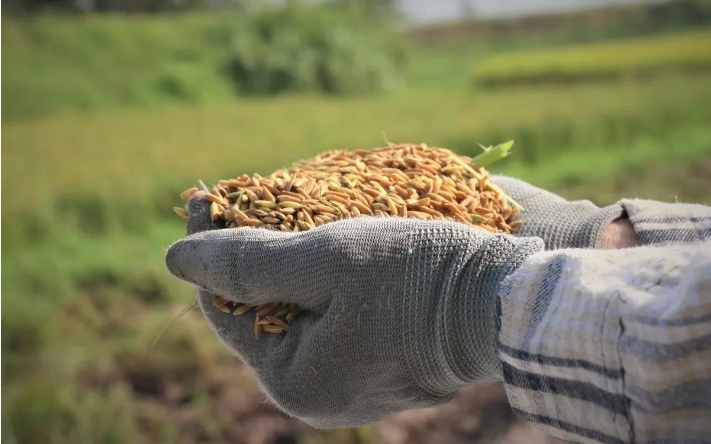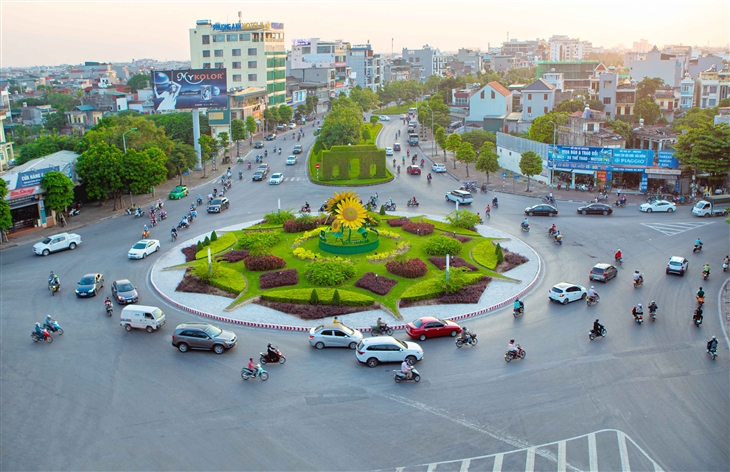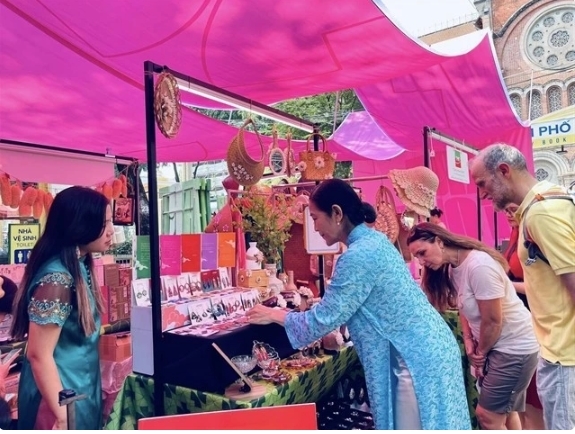Exporting agricultural products to the EU: Not quantity but quality
Thursday, May 15,2025
AsemconnectVietnam - Demand for goods and agricultural products of the EU market is very large, however, the most important issue to bring goods to Europe is standards and quality.
High market, high standards
As a company specializing in exporting rice to large markets, including the EU market, sharing with reporters of Cong Thuong Newspaper, Mr. Pham Thai Binh, Chairman of Board of Directors of Trung An High-Tech Agriculture Joint Stock Company, said that currently, export orders to the EU market are quite regular. The company's rice export market share to the EU accounts for a relatively large proportion of the company's total export turnover, however, compared to total amount of Vietnamese rice exported to the EU, this number is still modest.
"Since the beginning of this year, the company has exported dozens of containers of rice to the EU market. Orders are maintained regularly every month to ensure a stable supply for customers in this market throughout the year," said Mr. Pham Thai Binh.
Vietnamese rice exported to the EU market mainly serves the Vietnamese community. Europeans have also used more rice in their meals. Each year, this market imports over 2 million tonnes of rice.
According to Mr. Pham Thai Binh, although the rice export market has been approaching for a long time, volume of rice exports has increased rapidly since around 2020. In recent times, although the rice export market has fluctuated a lot, because businesses have chosen the high-quality rice segment, the price and export volume have been quite stable. The price of rice exported to the EU market has never been below 700 USD/tonne, of which, for ST rice alone, it has reached approximately 1,200 USD/tonne.
Although this price is high compared to other types of rice exported from Vietnam, compared to the price of rice from many countries exporting rice to the EU, this is a normal price, even a bit low.
According to Mr. Pham Thai Binh, the most important thing to bring goods to Europe is standards and quality. This requires the Vietnamese rice industry to develop sustainably. This means that production must follow EU standards and regulations and we must start right from the production stage. Compared to other rice exporting countries such as India and Thailand, Vietnam can compete the most in the EU market thanks to the signing of the Vietnam - EU Free Trade Agreement (EVFTA). However, according to Mr. Pham Thai Binh, signing of EVFTA helps reduce trade barriers or tariff incentives, but if the rice does not meet market standards, it will not be able to enter.
"EU market can accept import of high-quality rice at prices up to 2,000 USD/tonne, but in return, they have very high requirements for quality and food safety. Therefore, businesses must strictly comply with EU standards to achieve high-value and long-term rice sales contracts," said Mr. Pham Thai Binh.
Building a long-term strategy for the EU market
According to the commitment from the EVFTA Agreement, the EU gives Vietnam a quota of 80,000 tonnes of rice per year. In particular, the union will completely liberalize broken rice, a commitment that will enable Vietnam to export an estimated 100,000 tonnes to the bloc each year.
For rice products, the EU will reduce the tax rate to 0% after 3-5 years. This opens up opportunities for Vietnamese rice to compete with other countries when exporting to the EU. Currently, Vietnam has risen to 8th place among non-bloc markets supplying rice to the EU.
Notably, after 5 years of implementing the EVFTA, exports of goods in general from Vietnam to the EU have grown strongly thanks to tariff incentives. In 2024, Vietnam will maintain a trade surplus with the EU at the highest level among the FTAs that Vietnam has participated in.
Market opportunities for agricultural products in general and rice in particular in the EU market are huge. However, according to Mr. Ngo Xuan Nam - Deputy Director of the Vietnam SPS Office, for markets with very high food quality and safety standards such as the EU, agricultural and food exporting enterprises need to increase information updates and promptly respond to new related regulations. This is a prerequisite to increase the competitiveness of Vietnamese goods. In addition to the efforts of the enterprises themselves, Mr. Ngo Xuan Nam proposed that the authorities must increase information updates and disseminate new EU standards to producers. In addition, there should be detailed instructions on export procedures, labeling, food safety certification, etc. for processing and packaging facilities and agricultural and food exporting enterprises.
Stakeholders also need to strengthen inspection and close supervision of supply chain, raw material areas, production stages, preliminary processing, processing, packaging and transportation facilities to ensure compliance with regulations on sanitary and phytosanitary measures and animal and plant quarantine.
In long term, it is necessary to synchronously deploy many solutions to raise awareness, organize Vietnam SPS system, policy mechanisms, resources, international cooperation... especially building long-term plans and strategies for the EU market.
Industry experts also believe that production needs to be linked to the market. Therefore, it is necessary to develop a set of criteria for classifying export markets for key agricultural, forestry and fishery products. At the same time, it is necessary to build raw material areas that meet export standards, along with improving processing capacity and linking along the value chain.
EU is a demanding market. This market is for businesses with a professional and methodical way of doing business. High and strict requirements are not barriers but market standards. Once met well, this is the 'brand' for businesses to affirm their position in the EU market.
Source: Vitic/ congthuong.vn
As a company specializing in exporting rice to large markets, including the EU market, sharing with reporters of Cong Thuong Newspaper, Mr. Pham Thai Binh, Chairman of Board of Directors of Trung An High-Tech Agriculture Joint Stock Company, said that currently, export orders to the EU market are quite regular. The company's rice export market share to the EU accounts for a relatively large proportion of the company's total export turnover, however, compared to total amount of Vietnamese rice exported to the EU, this number is still modest.
"Since the beginning of this year, the company has exported dozens of containers of rice to the EU market. Orders are maintained regularly every month to ensure a stable supply for customers in this market throughout the year," said Mr. Pham Thai Binh.
Vietnamese rice exported to the EU market mainly serves the Vietnamese community. Europeans have also used more rice in their meals. Each year, this market imports over 2 million tonnes of rice.
According to Mr. Pham Thai Binh, although the rice export market has been approaching for a long time, volume of rice exports has increased rapidly since around 2020. In recent times, although the rice export market has fluctuated a lot, because businesses have chosen the high-quality rice segment, the price and export volume have been quite stable. The price of rice exported to the EU market has never been below 700 USD/tonne, of which, for ST rice alone, it has reached approximately 1,200 USD/tonne.
Although this price is high compared to other types of rice exported from Vietnam, compared to the price of rice from many countries exporting rice to the EU, this is a normal price, even a bit low.
According to Mr. Pham Thai Binh, the most important thing to bring goods to Europe is standards and quality. This requires the Vietnamese rice industry to develop sustainably. This means that production must follow EU standards and regulations and we must start right from the production stage. Compared to other rice exporting countries such as India and Thailand, Vietnam can compete the most in the EU market thanks to the signing of the Vietnam - EU Free Trade Agreement (EVFTA). However, according to Mr. Pham Thai Binh, signing of EVFTA helps reduce trade barriers or tariff incentives, but if the rice does not meet market standards, it will not be able to enter.
"EU market can accept import of high-quality rice at prices up to 2,000 USD/tonne, but in return, they have very high requirements for quality and food safety. Therefore, businesses must strictly comply with EU standards to achieve high-value and long-term rice sales contracts," said Mr. Pham Thai Binh.
Building a long-term strategy for the EU market
According to the commitment from the EVFTA Agreement, the EU gives Vietnam a quota of 80,000 tonnes of rice per year. In particular, the union will completely liberalize broken rice, a commitment that will enable Vietnam to export an estimated 100,000 tonnes to the bloc each year.
For rice products, the EU will reduce the tax rate to 0% after 3-5 years. This opens up opportunities for Vietnamese rice to compete with other countries when exporting to the EU. Currently, Vietnam has risen to 8th place among non-bloc markets supplying rice to the EU.
Notably, after 5 years of implementing the EVFTA, exports of goods in general from Vietnam to the EU have grown strongly thanks to tariff incentives. In 2024, Vietnam will maintain a trade surplus with the EU at the highest level among the FTAs that Vietnam has participated in.
Market opportunities for agricultural products in general and rice in particular in the EU market are huge. However, according to Mr. Ngo Xuan Nam - Deputy Director of the Vietnam SPS Office, for markets with very high food quality and safety standards such as the EU, agricultural and food exporting enterprises need to increase information updates and promptly respond to new related regulations. This is a prerequisite to increase the competitiveness of Vietnamese goods. In addition to the efforts of the enterprises themselves, Mr. Ngo Xuan Nam proposed that the authorities must increase information updates and disseminate new EU standards to producers. In addition, there should be detailed instructions on export procedures, labeling, food safety certification, etc. for processing and packaging facilities and agricultural and food exporting enterprises.
Stakeholders also need to strengthen inspection and close supervision of supply chain, raw material areas, production stages, preliminary processing, processing, packaging and transportation facilities to ensure compliance with regulations on sanitary and phytosanitary measures and animal and plant quarantine.
In long term, it is necessary to synchronously deploy many solutions to raise awareness, organize Vietnam SPS system, policy mechanisms, resources, international cooperation... especially building long-term plans and strategies for the EU market.
Industry experts also believe that production needs to be linked to the market. Therefore, it is necessary to develop a set of criteria for classifying export markets for key agricultural, forestry and fishery products. At the same time, it is necessary to build raw material areas that meet export standards, along with improving processing capacity and linking along the value chain.
EU is a demanding market. This market is for businesses with a professional and methodical way of doing business. High and strict requirements are not barriers but market standards. Once met well, this is the 'brand' for businesses to affirm their position in the EU market.
Source: Vitic/ congthuong.vn
Vietnam – New Zealand trade exchange in first 4 months of 2025
Vietnam’s coal imports totaled over 2.5 billion USD in 4 months
Vietnamese durian has more competitors in the billion-people market
Decoding reasons for a peak in coconut export prices
Export increase, agricultural sector has trade surplus of over 5.1 billion USD
Vietnam’s exports to Netherlands increased in 4 months
Vietnam’s coffee exports increased in value in 4 months
Vietnam - Kazakhstan Cooperation: Opening way to high value, foundational industries
Vietnam's farm, forestry, and seafood trade in 4 months of 2025
Vietnam’s industrial production index increased in April
Vietnam's exports to UK increased in 4 months of 2025
Vietnam’s imports of goods from US increased in April
DAILY: Export rice prices increased slightly on May 9, 2025
DAILY: Domestic pepper prices remained unchanged on May 9, 2025

Plan of Hai Duong province for a period of 2021 - 2030, ...
Organize space reasonably and harmoniously, focusing on connecting Hai Duong in common development space, actively contributing to the ...Plan of Hau Giang province in a period of 2021 - 2030, ...
Sustainable forestry development program in a period of ...

Art programme honouring Ao dai opens at HCM City Book ...
An art programme to honour and promote traditional cultural values and the beauty and grace of Ao dai has opened in Ho Chi Minh City. It ...From Hanoi to Brussels – a cross-cultural musical journey
Talented youngsters to enjoy int'l football ...
Tien Linh, Thuy Trang win Vietnam Golden Ball 2024
HCM City’s ao dai festival to feature mass folk dance with ...



